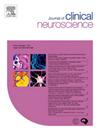Biomechanical analysis of scoliosis correction under the influence of muscular and external forces
IF 1.9
4区 医学
Q3 CLINICAL NEUROLOGY
引用次数: 0
Abstract
(1) Background: External force orthopedics and the strengthening of paraspinal muscles through exercise are common orthopedic methods for adolescent scoliosis, yet the synergetic mechanism of the two in orthopedic correction remains unclear. (2) Methods: A three-dimensional finite element model of the scoliotic spine was established to accurately simulate the mechanical properties of tissues such as the spine, intervertebral discs, and ribs. By applying external forces in different directions to the scoliosis model, the orthopedic effects of these forces on scoliosis were analyzed. Furthermore, considering the influence of muscular forces on scoliosis, the role of muscle contraction in the correction of scoliosis was simulated. (3) Results: The applied external forces significantly reduced both the Cobb angle and the vertebral rotation angle of the scoliotic spine. Specifically, the Cobb angle was corrected from 25° to 14°, achieving a scoliosis correction rate of 44%, while the apical vertebral rotation angle was corrected from 10.8° to 8.59°, resulting in a rotation correction rate of 20.46%. Furthermore, with the addition of muscular forces, the scoliosis correction rate increased further to 75.08%, and the apical vertebral rotation correction rate reached 11.39%; (4) Conclusions: Simultaneous exercise of paraspinal muscles while wearing an orthosis to improve muscular imbalance, can further reduce the Cobb angle and enhance the orthopedic effect.
肌肉和外力作用下脊柱侧凸矫正的生物力学分析。
(1)背景:外力矫形和通过运动强化棘旁肌是青少年脊柱侧凸常见的矫形方法,但两者在矫形矫正中的协同作用机制尚不清楚。(2)方法:建立脊柱侧凸的三维有限元模型,准确模拟脊柱、椎间盘、肋骨等组织的力学性能。通过对脊柱侧凸模型施加不同方向的外力,分析这些外力对脊柱侧凸矫形的影响。此外,考虑肌肉力对脊柱侧凸的影响,模拟肌肉收缩在脊柱侧凸矫正中的作用。(3)结果:施加外力后,脊柱侧凸的Cobb角和椎体旋转角均明显减小。其中Cobb角由25°矫正为14°,脊柱侧凸矫正率为44%;椎体根尖旋转角由10.8°矫正为8.59°,脊柱侧凸矫正率为20.46%。此外,随着肌肉力的增加,脊柱侧凸矫正率进一步提高至75.08%,根尖椎体旋转矫正率达到11.39%;(4)结论:佩戴矫形器时同时锻炼椎旁肌肉,改善肌肉不平衡,可进一步减小Cobb角,提高矫形效果。
本文章由计算机程序翻译,如有差异,请以英文原文为准。
求助全文
约1分钟内获得全文
求助全文
来源期刊

Journal of Clinical Neuroscience
医学-临床神经学
CiteScore
4.50
自引率
0.00%
发文量
402
审稿时长
40 days
期刊介绍:
This International journal, Journal of Clinical Neuroscience, publishes articles on clinical neurosurgery and neurology and the related neurosciences such as neuro-pathology, neuro-radiology, neuro-ophthalmology and neuro-physiology.
The journal has a broad International perspective, and emphasises the advances occurring in Asia, the Pacific Rim region, Europe and North America. The Journal acts as a focus for publication of major clinical and laboratory research, as well as publishing solicited manuscripts on specific subjects from experts, case reports and other information of interest to clinicians working in the clinical neurosciences.
 求助内容:
求助内容: 应助结果提醒方式:
应助结果提醒方式:


